Making Money Online with AI Music

Imagine having the power to turn your passion for music into a thriving online business. Well, with AI music, that possibility is now a reality. In this article, we will explore the fascinating world of AI music and discover how it can be a lucrative avenue for earning money online.
By harnessing the capabilities of artificial intelligence, you can create unique and captivating music that resonates with audiences worldwide.
So, grab your headphones and get ready to dive into the exciting realm of making money online with AI music.
Table of Contents
Creating Artificial Intelligence Music
Understanding AI Music
AI music refers to the creation of music using artificial intelligence technologies. It involves using machine learning algorithms to compose, produce, and generate musical pieces without direct human intervention. This innovative approach to music production has opened up new possibilities for musicians, composers, and music enthusiasts.
How Does AI Create Music?
Artificial Intelligence music creation is primarily accomplished through the use of deep learning algorithms and neural networks. These algorithms are trained on vast amounts of existing music data to learn the patterns, structures, and styles of different genres. Once trained, the AI models can generate original compositions by combining and reinterpreting these learned elements. The generated music can then be further refined and customized by human composers.
Limitations of AI Music
While AI music creation has immense potential, it also has some limitations. One of the main challenges is that AI-generated music may lack the emotional depth and creativity that comes from human musical expression. While AI models can analyze and mimic existing musical patterns, they may struggle to capture the artistic nuances and emotional subtleties unique to individual musicians. Additionally, AI music may lack the improvisational and spontaneous elements that make live performances so captivating.
Tools and Software for Creating AI Music
There are various tools and software available to assist in creating AI music. One popular option is using platforms that provide pre-trained Artificial Intelligence models specifically designed for music generation, such as OpenAI’s MuseNet and Jukedeck. These platforms offer user-friendly interfaces and allow musicians to easily generate and customize AI-generated music. Additionally, there are software libraries like Magenta and DeepJazz that provide more advanced capabilities for AI music creation, enabling users to experiment with different algorithms and techniques.
Developing AI Music Skills
To effectively create Artificial Intelligence music, it is crucial to develop and refine certain skills. Familiarity with music theory and composition principles is essential for understanding the structural elements of music and how to manipulate them effectively. Additionally, gaining expertise in machine learning techniques and programming languages like Python can facilitate the training and customization of AI models. Continuous learning, experimentation, and keeping up with the latest AI music trends are key to improving and expanding one’s AI music skills.
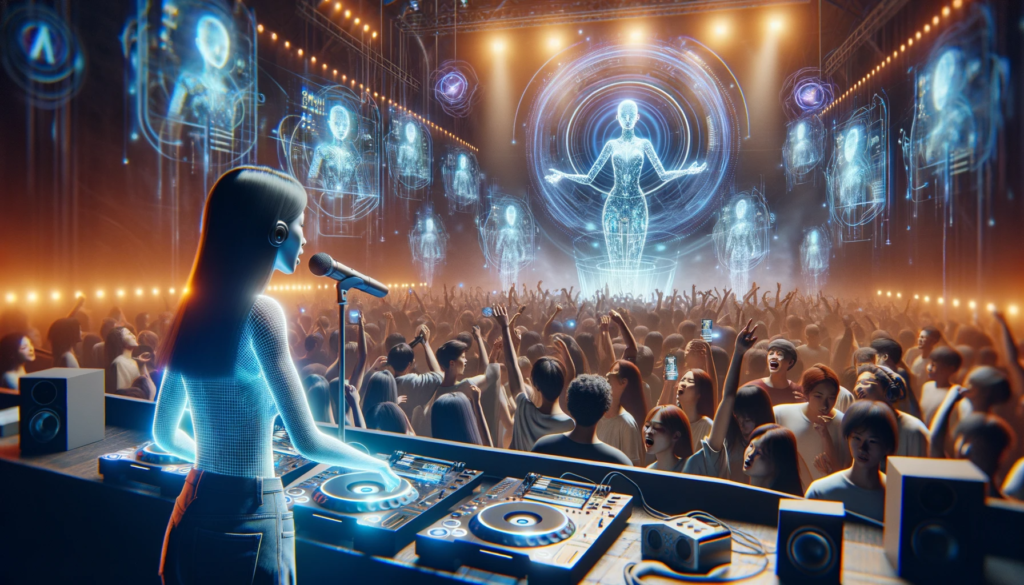
Monetizing AI Music
Exploring Potential Earning Opportunities
There are numerous ways to monetize AI music skills. One option is to offer AI music composition services to individuals, businesses, and content creators who are seeking original music for their projects. This can include producing background music for videos, commercials, podcasts, and advertisements. Collaborating with artists, filmmakers, and game developers can also lead to exciting opportunities for creating AI music.
Licensing AI-Generated Music
Licensing AI-generated music can be a profitable avenue for monetization. By obtaining the necessary licenses, musicians can distribute their AI-generated compositions to platforms like streaming services, video-sharing platforms, and online radio stations. These platforms offer licensing opportunities that allow artists to earn royalties based on the number of streams or downloads their music receives.
Selling AI-Generated Music Online
Another way to monetize Artificial Intelligence music is by selling AI-generated music directly to consumers. Musicians can establish online platforms or utilize existing marketplaces to sell their compositions as digital downloads or physical copies. Additionally, creating exclusive and limited-edition releases can attract collectors and enthusiasts who are willing to pay a premium for unique AI-generated music.
Collaborating with Artists and Content Creators
Collaborating with artists and content creators can open up new avenues for monetization and exposure. By teaming up with musicians, filmmakers, or YouTubers, Artificial Intelligence music creators can contribute their skills to enhance existing projects or create original content together. This collaborative approach not only allows for the creation of unique music but also helps to expand the reach and visibility of AI music in different artistic mediums.
Offering Custom AI Music Services
Offering custom AI music composition services can be a lucrative business opportunity. Many businesses and content creators often require custom-made music to align with their specific brand or project requirements. By leveraging AI music technology, composers can tailor compositions to meet the individual needs and preferences of clients, thereby providing a personalized and unique music experience.
Building an Online Presence
Creating a Professional Website
A professional website is essential for establishing an online presence as an AI music creator. The website should showcase the AI music creator’s portfolio, provide information about their services, and include contact details for potential clients. It is important to design the website in a visually appealing and user-friendly manner to attract visitors and leave a lasting impression.
Utilizing Social Media Platforms
Social media platforms offer a powerful way to connect with potential clients and music enthusiasts. Creating accounts on platforms like Instagram, Facebook, and Twitter allows Artificial Intelligence music creators to share their music, engage with followers, and build a community around their work. Regularly posting updates, behind-the-scenes content, and music samples can help maintain an active and engaged social media presence.
Showcasing AI Music Portfolio
An effective way to attract clients and demonstrate expertise is by showcasing an AI music portfolio. This portfolio should include a diverse range of compositions, highlighting the versatility of the AI music creator’s skills. Including audio samples, videos, and testimonials from satisfied clients can further lend credibility and provide potential clients with a glimpse of the AI music creator’s capabilities.
Engaging with the AI Music Community
Engaging with the AI music community can offer valuable networking opportunities and foster knowledge-sharing. Participating in forums, online communities, and industry events specific to AI music allows AI music creators to connect with like-minded individuals, exchange ideas, and stay updated on the latest developments in the field. Collaborating with other AI music creators can also lead to exciting joint projects and mutual growth.
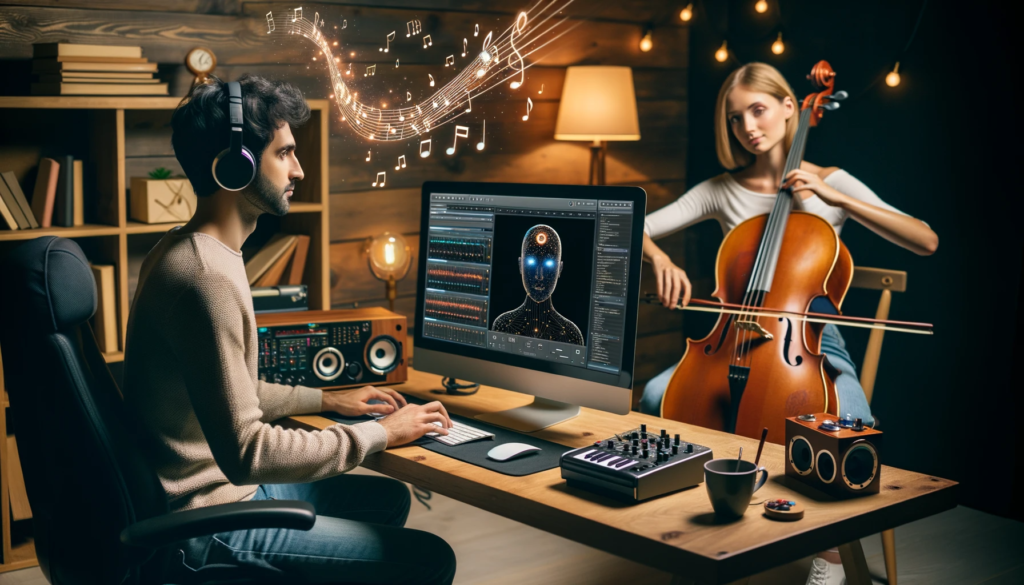
Participating in Online Contests and Challenges
Participating in online contests and challenges can provide exposure and recognition for AI music creators. Many platforms and organizations host competitions focused on AI-generated music, offering prizes and opportunities to showcase talent. Engaging in these contests not only provides a chance to receive feedback from industry professionals but also serves as a platform to gain visibility and potentially attract clients.
Marketing and Promotion
Developing a Unique Brand Identity
Establishing a unique brand identity is crucial for standing out in the competitive AI music industry. Creating a distinct visual identity, including a logo, color palette, and overall design aesthetic, helps to create a memorable brand image. Crafting a compelling brand story that showcases the Artificial Intelligence music creator’s passion, expertise, and unique approach to music creation can further enhance the brand identity and resonate with potential clients.
Creating Compelling AI Music Samples
Creating compelling AI music samples is pivotal for attracting potential clients. AI music creators should curate a collection of high-quality music samples that showcase their range, style, and abilities. These samples should effectively communicate the AI music creator’s unique artistic vision and technical competency, thereby instilling confidence in potential clients and demonstrating the value of their services.
Optimizing Online Searchability
Ensuring online searchability is essential for reaching a broader audience. Artificial Intelligence music creators should optimize their website and social media profiles with relevant keywords, metadata, and descriptions to enhance discoverability. Creating informative and engaging content, such as blog articles, tutorials, and informative videos, can also help boost search engine rankings and attract organic traffic.
Building a Network of Industry Professionals
Building a network of industry professionals can open up numerous opportunities for collaboration and growth. Attending AI music conferences, industry events, and workshops allows AI music creators to connect with individuals who share similar interests and passions. Actively engaging, networking, and collaborating with industry professionals not only expands one’s knowledge base but also increases visibility within the industry.
Utilizing Online Advertising
Online advertising can be an effective way to reach a wider audience and generate leads. Platforms like Google Ads and social media advertising offer targeted advertising options that allow AI music creators to reach potential clients based on their interests, demographics, and behaviors. Crafting compelling and visually appealing advertisements that highlight the unique selling points of Artificial Intelligence music services can attract potential clients and drive traffic to websites or social media profiles.
Copyright and Legal Considerations
Understanding Copyright Laws
Understanding copyright laws is crucial for AI music creators to protect their original compositions and avoid infringement. Copyright grants the creator of an original work exclusive rights to reproduce, distribute, and publicly display their work. It is important to familiarize oneself with the copyright laws in the jurisdiction in which one operates and to ensure compliance with applicable regulations.
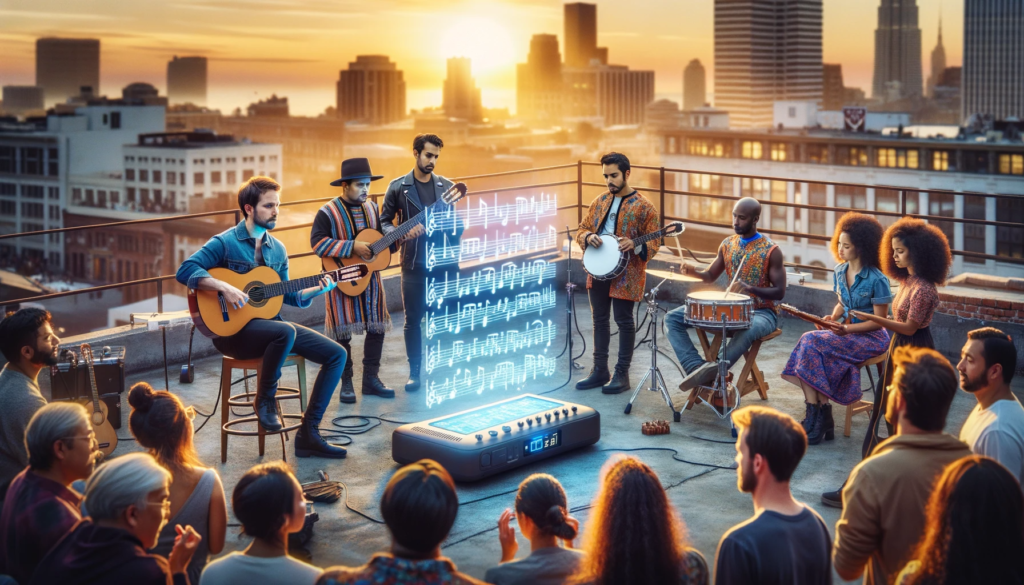
Protecting AI Music with Copyright
AI music creators can protect their AI-generated compositions by utilizing copyright. Although there is ongoing debate about the copyright ownership of AI-generated works, it is generally advisable to register copyright for original Artificial Intelligence music compositions. Registering copyrights provides legal evidence of ownership and can serve as a deterrent to potential infringers, as well as facilitate legal action against those who unlawfully use AI-generated music.
Properly Crediting AI Music Creators
Properly crediting AI music creators is an important ethical consideration. While AI algorithms play a significant role in generating music, it is crucial to acknowledge the contribution and involvement of Artificial Intelligence music creators in the creative process. Providing appropriate credit and attribution helps recognize the efforts and skills of the AI music creators and fosters a culture of respect and fairness within the industry.
Obtaining Licenses for Third-Party Content
AI music creators must also obtain proper licenses for any third-party content used in their compositions. This includes obtaining licenses for samples, loops, or vocals that are incorporated into AI-generated music. Failure to obtain the necessary licenses can result in copyright infringement and legal consequences. Platforms like Splice and Epidemic Sound offer royalty-free music libraries that can be used legally in Artificial Intelligence music compositions.
Seeking Legal Advice
When facing complex legal issues related to AI music, it is advisable to seek professional legal advice. Legal experts specializing in intellectual property and copyright law can provide guidance and assistance with properly protecting AI music compositions, navigating licensing agreements, and ensuring compliance with applicable laws. Seeking legal advice can help Artificial Intelligence music creators make informed decisions and protect their interests.
Challenges and Potential Risks
Ethical Concerns with AI Music
Ethical concerns surrounding AI music creation have garnered attention in recent years. One significant concern is the potential for AI-generated music to replace human musicians and composers, leading to job displacement in the industry. Additionally, questions regarding copyright ownership and the extent of human input in AI-generated compositions raise ethical debates. It is essential for Artificial Intelligence music creators to navigate these concerns responsibly and promote a balanced coexistence between AI-generated and human-made music.
Quality Control in AI Music Production
Ensuring quality control in AI music production is an ongoing challenge. While AI algorithms can generate vast amounts of music, not all compositions may meet the expected standards of creativity and musicality. Human intervention and assessment are necessary to refine and curate AI-generated compositions. Improving the quality control measures within Artificial Intelligence music production is crucial for maintaining the integrity and artistic value of the music created.
Competition in the AI Music Industry
As Artificial Intelligence music gains popularity, competition in the industry is increasing. AI music creators must be prepared to distinguish themselves from others by offering unique value propositions and constantly striving for innovation. Demonstrating technical expertise, artistic vision, and a deep understanding of AI music’s potential can help AI music creators stand out in a crowded market and attract clients.
Adapting to Changing Technological Advances
The field of AI music is constantly evolving, with new advancements and technologies emerging regularly. AI music creators must continuously adapt to these changes, stay updated with the latest trends, and experiment with new techniques. Failure to adapt to evolving technologies may result in being left behind and losing relevance within the industry. Continuous learning and staying at the forefront of Artificial Intelligence music advancements are imperative for long-term success.
Potential Risks of AI Misuse
Like any powerful technology, AI music also carries potential risks if misused. AI-generated music has the potential to be used for fraudulent activities, such as creating counterfeit compositions or manipulating copyright ownership. AI music creators must prioritize ethical conduct, respect copyright laws, and advocate for responsible use of AI-generated music. Collaborating with industry professionals, staying informed, and being vigilant can help mitigate these risks.
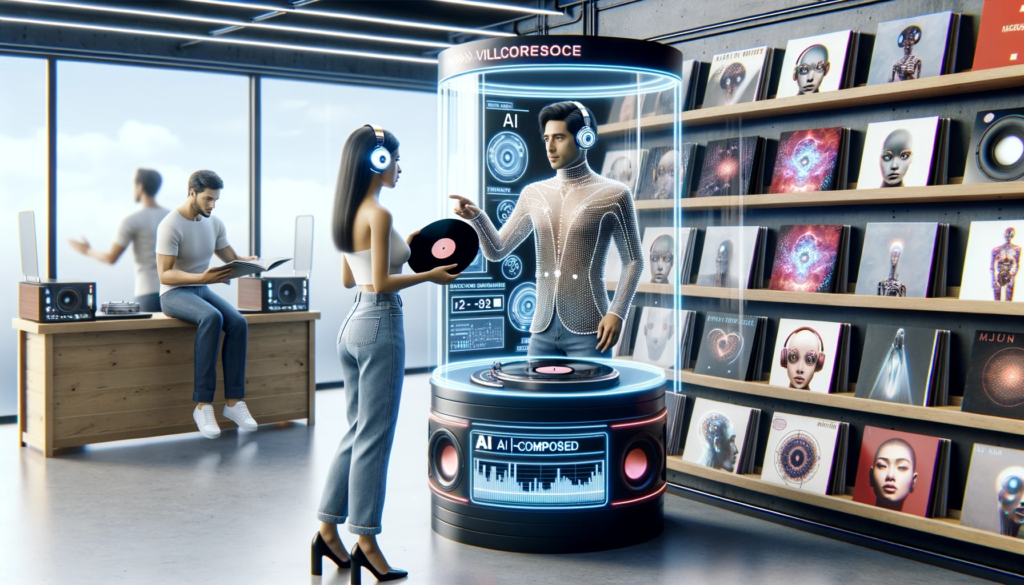
Building a Customer Base
Identifying Target Audience
Identifying a target audience is crucial for effective marketing and creating Artificial Intelligence music that resonates with potential customers. AI music creators should conduct market research and identify the specific demographics, interests, and needs of their target audience. This knowledge enables AI music creators to tailor their compositions, branding, and marketing strategies to appeal to their ideal customers.
Developing a Branding Strategy
Developing a cohesive branding strategy is essential for attracting and retaining customers. AI music creators should carefully craft their brand identity, voice, and messaging to align with the interests and preferences of their target audience. Consistency in branding across all platforms, including logos, visual elements, and tone of communication, helps create a memorable and trustworthy brand that customers can connect with.
Researching Market Trends
Staying informed about market trends is crucial for AI music creators to adapt their offerings and stay ahead of the competition. By monitoring industry trends, including evolving musical genres, emerging technologies, and changing client needs, AI music creators can effectively tailor their compositions and services to meet market demand. Embracing new trends and adjusting business strategies accordingly can lead to increased customer satisfaction and business growth.
Engaging with Potential Customers
Engaging with potential customers is vital for building relationships and establishing trust. AI music creators should actively seek opportunities to interact with their audience through social media, webinars, online forums, or even personalized consultations. Providing informative and valuable content, responding to inquiries promptly, and demonstrating a genuine interest in customers’ needs can create a positive impression and encourage customers to patronize AI music services.
Collecting and Utilizing Customer Feedback
Collecting and utilizing customer feedback is crucial for improving AI music services and meeting customer expectations. AI music creators should encourage customers to provide feedback on compositions, service quality, and overall experience. Analyzing this feedback and making necessary adjustments based on customer preferences helps refine AI music compositions and ensures that future offerings better align with customers’ needs and desires.
Expanding AI Music Business
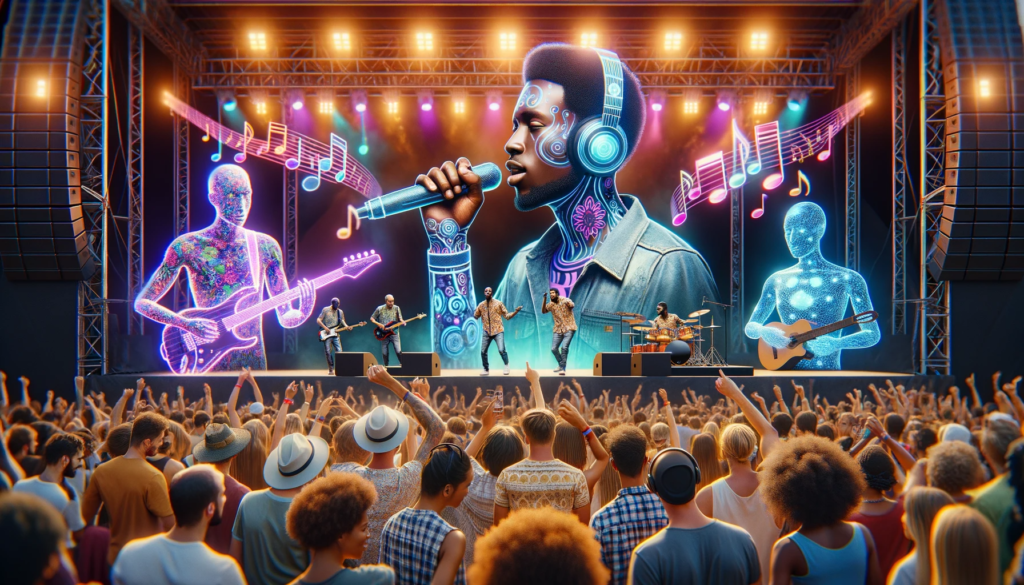
Collaborating with Music Industry Professionals
Collaborating with music industry professionals presents opportunities for growth and exposure. By working with established musicians, producers, or record labels, AI music creators can tap into existing networks, gain credibility, and reach broader audiences. Collaborations can take the form of remixes, joint productions, or even mentorship opportunities, allowing AI music creators to learn from experienced professionals and leverage their expertise.
Diversifying AI Music Services
Diversifying AI music services can expand the range of potential customers and revenue streams. AI music creators can offer additional services, such as sound design, audio branding, or music consultation, to cater to different client needs. By leveraging their expertise in AI music, they can provide comprehensive solutions to clients looking for a complete music production package.
Exploring International Markets
With the internet connecting people worldwide, AI music creators can explore international markets to expand their business. Researching and understanding cultural preferences and musical traditions in different regions can enable AI music creators to create compositions that resonate with audiences globally. Localizing marketing efforts and collaborating with musicians from diverse backgrounds can also enhance their appeal and attract a broader customer base.
Creating Partnerships and Alliances
Creating partnerships and alliances can amplify the reach and impact of AI music creators. Collaborating with technology companies, media agencies, or streaming platforms can lead to mutually beneficial ventures, such as joint marketing campaigns, exclusive streaming rights, or product integrations. These partnerships not only increase visibility but also provide opportunities for cross-promotion and access to new audiences.
Scaling Up AI Music Production
As demand for AI music services grows, scaling up production capabilities becomes crucial. AI music creators can consider leveraging cloud-based computing resources to process and generate music more efficiently. Additionally, hiring additional talent, such as composers or sound designers, can help increase output and cater to a larger client base. Implementing effective project management systems and workflow optimizations can also streamline production processes and enhance efficiency.
Continuous Skill Development
Staying Updated with AI Music Trends
Staying updated with AI music trends is vital for AI music creators to remain competitive. Following industry publications, blogs, and newsletters can provide insights into the latest advancements, research, and breakthroughs in AI music. Engaging in online communities, attending webinars, and participating in online courses or workshops dedicated to AI music can further enhance knowledge and expertise in the field.
Exploring New AI Music Techniques
Exploring new AI music techniques and experimenting with different approaches is crucial for continued growth and innovation. AI music creators should stay curious and open to exploring unconventional methods and tools. This includes experimenting with new AI models, algorithms, or even incorporating other emerging technologies like virtual reality or augmented reality into music creation. Embracing experimentation keeps the creative process fresh and allows for the discovery of unique musical styles.
Attending Workshops and Conferences
Attending workshops and conferences dedicated to AI music provides valuable opportunities for learning, networking, and inspiration. Industry events often feature keynote speakers, panel discussions, demonstrations, and hands-on workshops where AI music creators can gain insights and practical knowledge. Engaging with speakers and fellow attendees can lead to collaborations, mentorships, and valuable connections within the AI music community.
Networking with AI Music Professionals
Networking with other AI music professionals is crucial for knowledge-sharing and staying connected within the industry. Attending AI music meetups, joining AI music-focused organizations, and actively participating in online forums or social media groups dedicated to AI music facilitates networking opportunities. Building relationships with fellow professionals allows for the exchange of ideas, collaboration on projects, and access to new opportunities.
Experimenting with AI Music Styles
AI music creators should embrace experimentation with different musical styles and genres. By exploring a diverse range of musical styles, from classical to electronic or even fusion genres, AI music creators can expand their creative horizons and cater to a wider audience. Experimentation fosters innovation, helps AI music creators develop a unique artistic voice, and increases their versatility in creating AI music compositions.
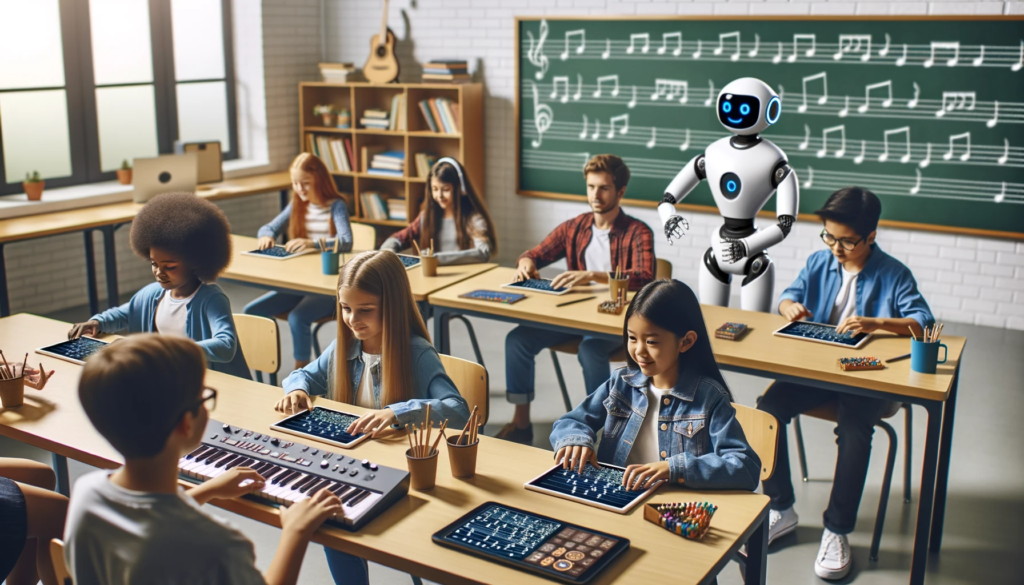
Wrap Up
Summary of AI Music as a Business
AI music provides exciting opportunities for musicians, composers, and music enthusiasts to create, monetize, and explore innovative forms of music. By leveraging AI technology, music creators can generate original compositions, collaborate with artists, and offer personalized music services. However, it is essential to navigate the legal considerations, address ethical concerns, and adapt to changing technological advances to ensure sustainable success in the AI music industry.
Encouragement for Exploring AI Music
AI music is a rapidly evolving field that presents endless possibilities for creativity and innovation. Aspiring AI music creators are encouraged to embrace the challenges, continuously develop their skills, and explore the uncharted territories of this emerging industry. By staying curious, open-minded, and engaged with the AI music community, individuals can unlock the full potential of AI to revolutionize the world of music.
Future of AI Music Industry
The future of the AI music industry holds immense promise. As AI technologies continue to advance, AI music has the potential to become increasingly sophisticated, expressive, and seamlessly integrated into various artistic mediums. Furthermore, as AI music receives wider acceptance and adoption, new business models, collaborations, and revenue streams will emerge, providing exciting opportunities for AI music creators to thrive.
Final Thoughts
AI music presents a compelling and dynamic landscape for individuals passionate about music and technology. By harnessing the power of AI, musicians and composers can push the boundaries of musical creation, monetize their skills, and connect with audiences worldwide. However, it is crucial to navigate the ethical, legal, and technical challenges inherent in this field to ensure the responsible and sustainable growth of the AI music industry.
FAQ
Q: What is AI music?
P: AI music refers to compositions or songs that are created with the help of artificial intelligence algorithms. These algorithms can analyze existing music patterns, learn from them, and generate new music compositions based on the learned patterns.
Q: How does AI create music?
P: AI music creation involves the use of machine learning algorithms. These algorithms can be trained on vast amounts of existing music data to understand patterns, structures, and harmonies. Once trained, the AI can generate new musical compositions by combining and reinterpreting the learned patterns.
Q: Can AI compose music that sounds human?
P: Yes, AI can compose music that sounds human-like. Advanced AI music algorithms can analyze the complexities of human-composed music and create new pieces that mimic various musical styles and genres. However, it may still be challenging for AI to fully capture the emotions and nuances expressed in music compositions.
Q: Is AI replacing human musicians?
P: AI is not intended to replace human musicians. Instead, it serves as a tool or creative assistant for musicians, composers, and producers. AI can aid in the music creation process, inspire new ideas, or even generate initial compositions that can be further refined and enhanced by human musicians.
Q: What are the benefits of AI music?
P: AI music offers several benefits, such as providing creative inspiration, assisting musicians in composing complex pieces, and helping artists explore new musical styles. It can also facilitate the generation of royalty-free music for media projects and serve as a tool for music education and experimentation.
Q: Can AI music be copyrighted?
P: Yes, AI-generated music can be copyrighted. However, determining the ownership and copyright of AI music can be a complex legal issue. In some cases, the copyright might belong to the human programmer or musician who trained the AI algorithm, while in others, it could be a joint ownership between the AI and the human.
Q: Are there any limitations to AI music?
P: AI music has certain limitations. Although it can analyze and mimic existing music patterns, it may struggle to capture the uniqueness and emotional depth found in human compositions. Additionally, AI may face challenges in creating innovative and boundary-pushing music that transcends established patterns and structures.
Q: Do AI algorithms learn from all types of music?
P: AI algorithms can learn from a wide range of music genres and styles. They can analyze patterns present in classical music, jazz, pop, rock, and various cultural music styles. By training on diverse music samples, the AI algorithms can generate compositions that reflect different musical influences.
Q: How can AI music benefit the music industry?
P: AI music has the potential to benefit the music industry in multiple ways. It can aid in the discovery of new talent by analyzing vast amounts of music and identifying emerging trends. Additionally, AI music can streamline the production process by generating draft compositions, helping in music arrangement, and providing virtual band-like accompaniments.
Q: Can AI music be used in commercial projects?
P: Yes, AI music can be used in various commercial projects. Many AI music platforms offer licenses for using their generated music in commercials, films, videos, podcasts, and other media projects. However, it is essential to review the licensing agreements and ensure compliance with the terms and conditions set by the AI music provider.
